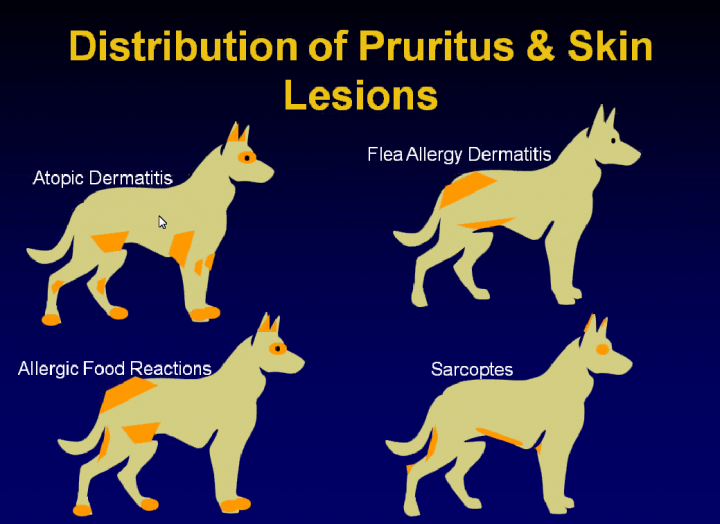Pruritus is a common finding in dogs and cats, and is often associated with an allergic condition. Three of the top four causes for pruritus in dogs are associated with allergy - including allergic food reactions, atopy, and flea allergy.
Pruritus often precedes the development of some of the more classic lesions that we can attribute with various conditions. For example, we know there are certain patterns of distribution for alopecia (or other lesions) associated with various etiologies:

Photo credit: Craig Griffin, DVM, DACVD
In the case of canine atopy, pruritus may be a complaint before hair loss associated with self trauma or other lesions are noted. In addition, patients may exhibit other signs including sneezing.
Gastrointestinal signs including vomiting, diarrhea, and changes in stool character and frequency are commonly seen in patients with primary GI problems (ie. inflammatory bowel disease). However, GI signs can be associated with other problems including food allergy or adverse food reactions.
Little has been reported on what is "normal" for frequency of bowel movements in dogs. Information from previous studies is conflicting regarding what defines "normal." Furthermore, little is known regarding the correlation (if any) between GI signs and pruritus in dogs with food allergy or adverse food reactions.
In this week's Evidence Based Update, we discuss this topic and a paper from Veterinary Dermatology on the correlation between pruritus and gastrointestinal signs in healthy dogs. Discussion includes:
View this Evidence Based Update (Running time 20 mins; Approved for CE credit in New York and by the NJVMA, pending approval for CE credit by AAVSB RACE).
I happen to have a dog that has severe food allergies, food intolerances, and probably some component of atopy, too. I found this EBU very interesting, and I thank my colleague - Dr. Zenger - for covering this topic. I expect / hope that the authors are carrying this study further and assessing patients over the long haul.
There are several reasons why I found the information from this EBU interesting:
1) It underscores the importance of good history taking and then taking a few moments to really consider the answers that clients provide to those questions.
2) As this paper (and Dr. Zenger) pointed out - the use of a scale / scoring system (pruritus and fecal - and any that are available to clinicians in practice) can be helpful in reducing subjectivity and in better assessing our patients. As this paper demonstrated, a client's perception of "normal" is not always correct.
3) I am intrigued about the correlation between use of probiotics and pruritus scores. Based on my personal experience (I think probiotics have been helpful as part of the multimodal approach to my dog's care), I believe this is something that needs to be examined further. I learned about VSL-3 from Dr. Keith Richter and a lecture on IBD - I now use it for my own dog (Forti Flora did nothing but give him diarrhea).
4) And regarding the findings on the use of fish oil - it has been helpful in the management of my dog's problems, and I, too, have seen soft stools in my dog (and others I've cared for). The authors of this paper did not have data on which fish oil products were used nor the dosages.
I've learned that when using therapeutic doses of fish oil - 40 mg / kg EPA + 25 mg / kg DHA - you may want to start off with sub-therapeutic doses (label recommendations as a supplement are usually much lower than therapeutic doses) and gradually increase up towards the full dose. I've always been able to work up to the full dose, but doing so over the course of a week or two might avert any GI upset / loose stools. This had been suggested to me by the folks at Nordic Naturals.